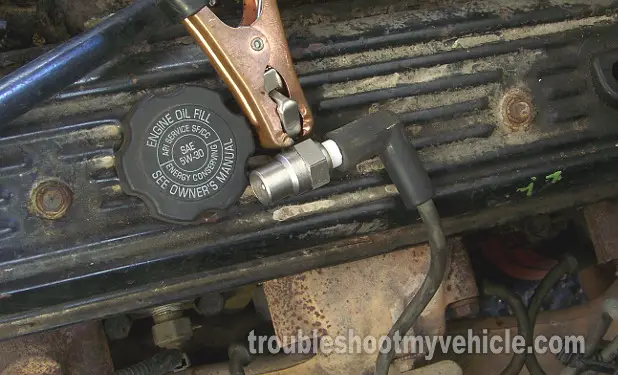
Testing a cranks but does not start condition on your GM 4.3L, 5.0L, 5.7L pick up, van or SUV is not that hard to do, if you have a solid diagnostic strategy. In this article I'll show you the basics of testing such a problem.
I'll also explain some of the basic causes of a no-start condition, since knowing this basic info will save you time and money since you'll know what to test and how to test it before replacing it.
Contents of this tutorial:
ES ![]() You can find this tutorial in Spanish here: Cómo Probar Un Arranca Pero No Prende (GM 4.3L, 5.0L, 5.7L) (at: autotecnico-online.com).
You can find this tutorial in Spanish here: Cómo Probar Un Arranca Pero No Prende (GM 4.3L, 5.0L, 5.7L) (at: autotecnico-online.com).
Difference Between A No Crank And A No Start Condition
It's important to know that a no-crank and a no-start condition are not the same thing since this article only concentrates on testing a no-start condition.
In layman's terms, a no-start condition means that your vehicle's starter motor is cranking the engine but the engine is not starting. This condition is usually due to a failed fuel pump, a failed ignition coil, a failed ignition control module, a failed crank sensor, etc., which lets the engine crank (turn over) but not start.
A no-crank condition means that the engine is not turning over when you turn the key to crank the engine. The most common problem, that causes this condition is a failed starter motor. If your vehicle is suffering a no-crank condition, this tutorial may be a good starting point: How To Test The Starter Motor (GM 4.3L, 5.0L, 5.7L).
No Start Condition Basics
There are three very basic components that the engine, in your GM vehicle, needs to start and they are: air, fuel, and spark.
When your 4.3L, 5.0L or 5.7L GM vehicle cranks but does not start, it's because one of these components is missing from the mix.
Now, it sucks that your vehicle does not start but the cool thing is that you can isolate the area where the problem exists and then test specific components within that system. There are three main areas where the problem will reside in and that you should concentrate on when facing a no-start condition:
1.) Ignition System
- The ignition system is the one responsible for creating and delivering spark. Without spark, the engine will crank but not start.
- The ignition system of the GM vehicles covered by this article use a distributor type system.
- In my experience, the most common component failures, of the ignition system that cause a 'no-start no-spark' condition are:
- Distributor cap.
- Crank sensor.
- Ignition module.
- Ignition coil.
- All of the above ignition system components can be tested.
2.) Fuel System
- The fuel system is the one responsible with supplying the engine with fuel.
- The fuel system component that causes the majority of no-start no-fuel problems:
- Fuel pump.
- The fuel pump can be tested to make sure it has really fried.
3.) Engine Mechanical System
- The engine pistons and valves (and all the other related components like: timing chains, etc.) are the ones responsible for the induction of the fresh air the engine needs for the combustion process.
- Although rare, internal engine mechanical problems can and do cause no-start conditions.
- Possible internal engine problems are:
- Blown head gasket.
- Blown engine.
4.) PassLock Anti-Theft System
- This is the passive theft deterrent system that tells the PCM that the engine is being cranked with the correct key.
- When a malfunction occurs in one of the components that make up the Passlock system, the PCM disables the fuel injectors after the engine has started, causing the engine to stall after about 3 seconds of run time.
- Passlock system failures are a very, very common cause of no-start conditions.
OK, the list of possible things that can go wrong looks pretty long but it is rare to see (or have) two different components go bad from two separate systems at the same time.
The cool thing is, is that there is a diagnostic strategy that you can use to figure out exactly what's wrong with your particular no-start problem. Let's find out more about it in the next subheading.
STEP 1: Checking For Spark

The very first thing you need to do is check for spark and the presence of fuel. Both of these tests should be done simultaneously if possible. As mentioned before, usually one of them will be missing from the mix.
The idea behind checking for spark (with a spark tester) is to see if all of the 8 engine cylinders are getting spark.
- Check that the 8 cylinders are getting spark with a spark tester.
- If spark exists in all 8 cylinders, this then confirms that:
- The distributor cap is good.
- The ignition coil is good.
- The ignition control module is good.
- The crankshaft position sensor is good.
- If there's no spark present in all 8 cylinders:
- The distributor cap could be bad.
- The ignition coil to distributor cap high tension wire could be bad.
- The ignition coil could be bad.
- The ignition control module could be bad.
- The crankshaft position sensor could be bad.
Testing the distributor cap, the ignition coil to distributor cap high tension wire, the ignition coil, the ICM, and the crank sensor can by done by the do it yourself-er (DIY'er) and the following tutorials will help you test the ignition system:
